18 Sep 2017 - {{hitsCtrl.values.hits}}
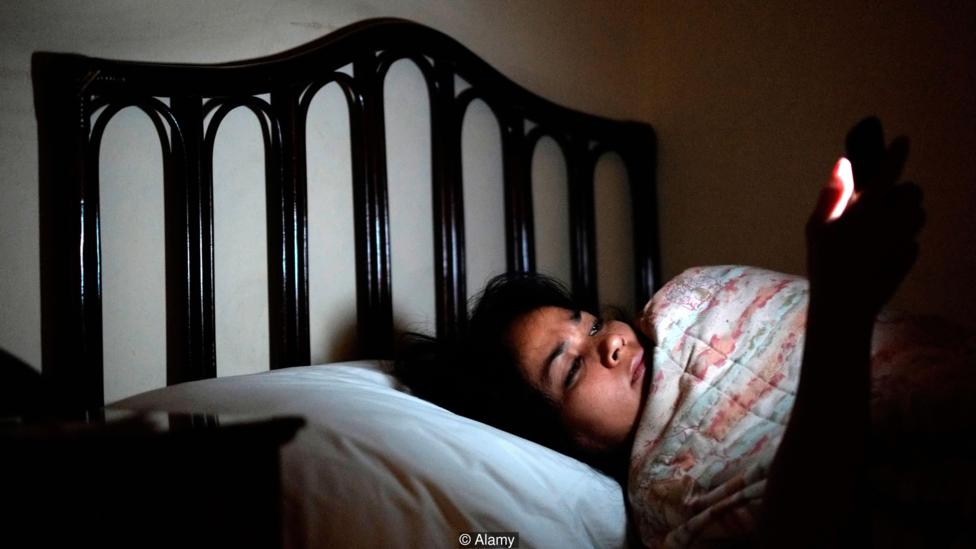
Sleep experts say our devices are keeping us awake for longer, which affects our sleep and health. So why on earth do we do it?
What was the last thing you did before drifting off last night? You were probably on a device: reading emails, surfing the web or checking social media.
You’re not alone. A study by the National Sleep Foundation estimates 48% of American adults use gadgets such as tablets or laptops in bed and studies in other countries show this is even more prevalent among younger adults.
But snuggling up with electronic devices is ruining your sleep: keeping you up later and waking you more frequently during the night. More research has shown that night time use of technology can have a detrimental effect on ability to cope with stress, self-esteem and general mental health. Without sufficient sleep, you’re less productive at work and long term health can suffer but few seem able to resist. So why do we do it?
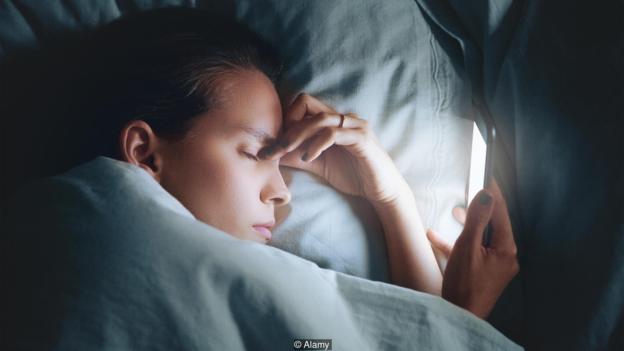
Sending a text message, posting on Facebook or checking your email means you are waiting for a response, which revs up your emotional nervous system (Credit: Alamy)
Sleep, interrupted
Unlike reading and TV, modern gadgets are interactive rather than passive. Their connectivity to the outside world intrudes into the bedroom, a place that has historically been somewhere private to unwind and forget about a hectic day.
“These devices are causing sleep procrastination,” says Matthew Walker, a professor of neuroscience and psychology at the University of California, Berkeley.
Experts say we need between 30 minutes and an hour of preparation before going to sleep to give our minds a chance to unwind from the stresses of the day. Things like reading a book, having a hot drink or doing a repetitive task like counting sheep all help.
When we pick up our phones, we are undoing that preparation our brains need by extending the day into the night-time hours
But, says Walker, when we pick up our phones, we are undoing that preparation our brains need by extending the day – together with all the stress and worry from it - into our night-time hours.
“We might feel perfectly sleepy and could drop off easily if the power went out and our phones didn’t work,” he says. “But when we pick up these devices it allows us to put off sleep. Often people will get into bed, someone will ping them on Facebook or send an email, and before they know it 20 to 30 minutes has gone.”
“Sending a text message, posting something on Facebook or checking your email means you are waiting for a response and revs up your emotional nervous system. Then once you put it down by your bedside, if you leave the phone on, there are all the pings, dings and other sounds that can wake you up during the night.”
It appears there is a marked difference between staying up late with a good book or watching television in bed and using smartphones, tablets and laptops. The way we interact with electronic devices allows them to eat into far more of the time we should be asleep, according to researchers.
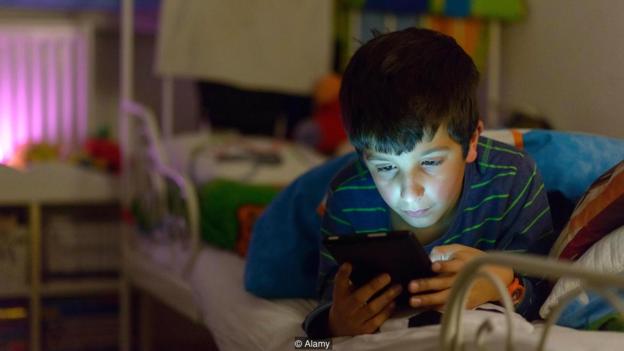
A review of 20 studies on children’s sleep patterns found that children with mobile devices in their rooms slept less deeply (Credit: Alamy)
For example, the blue light given off by many electronic screens can alter the release of a hormone called melatonin, which helps regulate sleep, and can throw the body’s internal biological clock out of sync.
Can’t put it down
Ben Carter, a biostatistician at the Institute of Psychiatry at King’s College London, has spent the past few years studying the impact of technology on sleep and has uncovered strong associations between the use of portable electronic devices in the bedroom and poor sleep.
Carter says we have allowed ourselves to sleepwalk “into a situation where we are in bed with our technology and it is controlling us,” he says. “There is no question that can have long-term impacts on the quality of our sleep.”
So, given the harm this can do, what’s going on? Carter likens the device behaviour to smoking.
“If it is something you do last thing at night and first thing in the morning, then you are probably addicted,” he says. According to Carter, being able to access information and engage with others around the clock is so pervasive to our knowledge-hungry, social brains that it can even affect those who should know better.
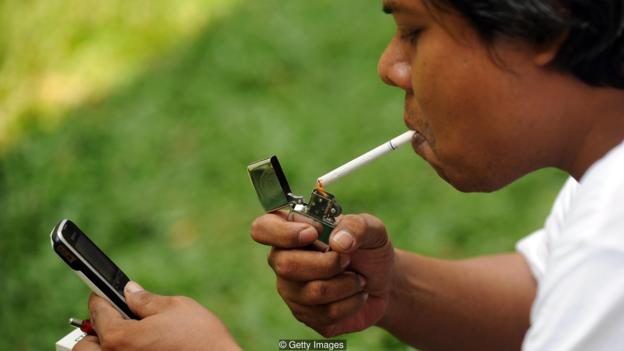
Much like smoking, chronic phone use can be an addiction (Credit: Getty Images)
“I talked recently with a professor of addiction who told me he wakes up in the night to check the American newspapers on his phone,” says Carter. “I also know I shouldn’t check my phone before bed, I don't want to do it, but it is actually very hard to detox.”
Sleep experts believe that, like quitting cigarettes, we must learn to wean ourselves off our gadgets at night so we feel comfortable leaving them in another room.
Just the presence of the device in their bedrooms was affecting their sleep
The National Sleep Foundation in the US found a fifth of people it surveyed were woken up by their devices in the night and half of those then picked them up to use them.
Carter conducted a review of 20 studies into the impact of technology on children’s sleep patterns, finding even those who did not use phones or other devices before bed but had them in their bedrooms, slept less deeply than those who left their devices in another room.
“Just the presence of the device in their bedrooms was affecting their sleep,” says Carter. “These children were still cognitively engaged with their devices.”
“Just having an object that creates a sense of anxiety in your bedroom will actually change the quality of your sleep,” says Walker. Worrying about something happening the next day, such as giving an important presentation at work, has been shown to not only keep people awake at night but also decrease the amount of deep sleep they get when they do drift off.
Deficiency and addiction
The Centers for Disease Control and Prevention in the US says that 35% of American adults are not sleeping enough, an increase from 29% ten years ago. To put this in perspective, the CDC now estimates 70 million US adults are sleeping less than six hours a night. This, it says, is leading to an epidemic of people struggling to concentrate or remember things at work. Insufficient sleep is also implicated in an increased risk of car crashes and industrial accidents.
Further sleep deficiency has been linked to a wide range of health problems, from heart disease and obesity to diabetes and depression.
It is perhaps the biggest unaddressed public health issue of our time - Colin Espie
“It is perhaps the biggest unaddressed public health issue of our time,” says Colin Espie, professor of sleep medicine at the University of Oxford. “Sleep is essential for a wide range of functions that serve our health and well being.”
Yet surprisingly, Walker says technology itself may hold the answer to regulate our night time slumbers. There are already many gadgets on the market that claim to monitor and aid sleep. And Walker hopes to use machine-learning technology to produce new ways of intervening if someone is not sleeping properly.
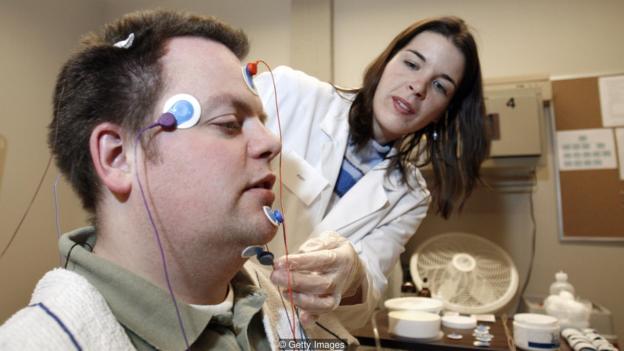
Washington State University Spokane's Sleep and Performance Research Center employs polysomnographic recording systems to measure sleep quality (Credit: Getty Images)
“It should be possible to produce a precise sleep prescription for each person to improve their sleep,” he says. “It could look at your calendar for the next day and suggest that because you have an early morning call in the morning, it might be worth getting ready for bed now so you can get enough sleep.”
Similarly, he suggests that algorithms could also gradually adjust our bedtime over several weeks to help us prepare for trips abroad and combat jet lag.
“There is no doubt that sleep has been desperately disrupted by our gadgets,” says Walker. “But I also think technology could be our salvation by helping to correct our sleep too.”
To comment on this story or anything else you have seen on BBC Capital, please head over to our Facebook page or message us on Twitter.
If you liked this story, sign up for the weekly bbc.com features newsletter called "If You Only Read 6 Things This Week". A handpicked selection of stories from BBC Future, Culture, Capital and Travel, delivered to your inbox every Friday.
www.bbc.com
23 Dec 2024 2 hours ago
23 Dec 2024 3 hours ago
23 Dec 2024 6 hours ago
23 Dec 2024 7 hours ago